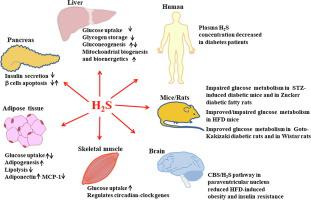Journal of Advanced Research ( IF 11.4 ) Pub Date : 2020-02-26 , DOI: 10.1016/j.jare.2020.02.013 Heng Zhang 1 , Yaqian Huang 2, 3 , Selena Chen 4 , Chaoshu Tang 5, 6 , Guang Wang 1 , Junbao Du 2, 3, 6 , Hongfang Jin 2, 3, 6

|
Background
Insulin resistance and impaired insulin secretion lead to disorders of glucose metabolism, which contributes to the development of diabetes. Hydrogen sulfide (H2S), a novel gasotransmitter, is found to play important roles in regulation of glucose metabolism homeostasis.
Aim of Review
This study aimed to summarize and discuss current data about the function of H2S in insulin secretion and insulin resistance regulation as well as the underlying mechanisms.
Key Scientific Concepts of Review
H2S could be endogenously produced in islet β cells, liver, adipose, skeletal muscles, and the hypothalamus, and regulates local and systemic glucose metabolism. It is reported that H2S suppresses insulin secretion, promotes or reduces the apoptosis of islet β cells. It plays important roles in the regulation of insulin sensitivity in insulin responsive tissues. H2S inhibits glucose uptake and glycogen storage, and promotes or inhibits gluconeogenesis, mitochondrial biogenesis and mitochondrial bioenergetics in the liver. In adipose tissue, several investigators indicated that H2S promoted glucose uptake in adipocytes, while other studies reported that H2S inhibits this process. H2S has also been shown to promote adipogenesis, inhibit lipolysis, and regulate adiponectin and MCP-1 secretion from adipocytes. In skeletal muscle, H2S increases glucose uptake and improves insulin sensitivity. It is also observed that H2S modulates circadian-clock genes in muscle. Hypothalamic CBS/H2S pathway reduces obesity and improves insulin sensitivity via the brain-adipose interaction. Most studies indicated plasma H2S levels decreased in diabetic patients. However, the mechanisms by which H2S regulates systemic glucose metabolism remain unclear. Whether H2S acts as a new promising target for diabetes mellitus treatment merits further studies.
中文翻译:

硫化氢调节糖尿病胰岛素分泌和胰岛素抵抗,糖尿病治疗新靶点?回顾
背景
胰岛素抵抗和胰岛素分泌受损导致葡萄糖代谢紊乱,从而导致糖尿病的发展。硫化氢 (H2S) 是一种新型的气体递质,被发现在调节葡萄糖代谢稳态中起重要作用。
审查目的
本研究旨在总结和讨论有关 H2S 在胰岛素分泌和胰岛素抵抗调节中的功能及其潜在机制的现有数据。
审查的关键科学概念
H 2 S 可在胰岛 β 细胞、肝脏、脂肪、骨骼肌和下丘脑中内源性产生,并调节局部和全身的葡萄糖代谢。据报道,H 2 S 抑制胰岛素分泌,促进或减少胰岛β细胞的凋亡。它在调节胰岛素反应组织中的胰岛素敏感性中起重要作用。H 2 S 抑制葡萄糖摄取和糖原储存,并促进或抑制肝脏中的糖异生、线粒体生物发生和线粒体生物能。在脂肪组织中,一些研究人员指出 H2S 促进了脂肪细胞对葡萄糖的摄取,而其他研究报告说 H 2 S 抑制了这一过程。H 2S 还被证明可以促进脂肪生成、抑制脂肪分解并调节脂肪细胞的脂联素和 MCP-1 分泌。在骨骼肌中,H 2 S 增加葡萄糖摄取并提高胰岛素敏感性。还观察到H 2 S 调节肌肉中的生物钟基因。下丘脑 CBS/H 2 S 通路通过脑-脂肪相互作用减少肥胖并提高胰岛素敏感性。大多数研究表明,糖尿病患者的血浆 H 2 S 水平降低。然而,H 2 S 调节全身葡萄糖代谢的机制仍不清楚。H 2 S 是否可以作为糖尿病治疗的新靶点值得进一步研究。











































 京公网安备 11010802027423号
京公网安备 11010802027423号